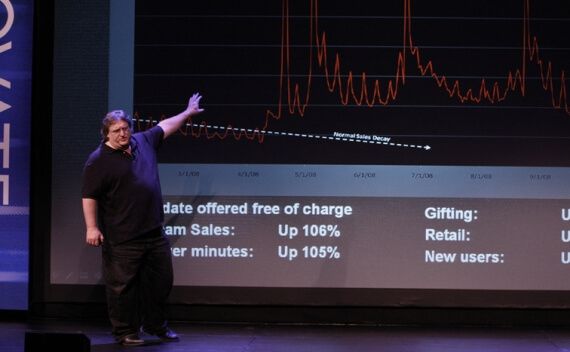Our world is moving towards a digital future in nearly every aspect. For the gaming industry, digital distribution has proven to not only be a feasible business model, but an incredibly profitable one. In the digital marketplace, Valve is king, with industry estimates reporting that the company controls a 70% share of the entire market. Valve's co-founder and President Gabe Newell recently sat down with a high school class to discuss some of the intricacies of the gaming industry, including an explanation of their sales model, revealing just how different the digital storefront is from its real-world counterparts.
For anyone unfamiliar with digital distribution, Valve's way of doing business would seem to be the antithesis of traditional thinking; giving PC owners the ability to download their distribution software Steam for no cost,and making a habit of lowering product prices when they would seem to be most profitable.
People in the games industry know that this is the same company who has given us Half-Life, Portal, Counter-Strike, and the upcoming Portal 2, so they clearly know what they're doing. The exact dollars and cents of the digital sales model has never been totally clear to those outside the industry, but Newell explained that the numbers support their practices, and ultimately lead to larger profits.
Don't take our word for it, hear how Newell warns the youth of America to take nothing for granted, especially human behavior in this digital age:
"So here's a simple example: when we work on sales, we try to encourage people - our partners and ourselves - to knock as much off the price as you can. So traditionally, if you did that in a retail channel, all you'd be doing is sort of cannibalizing yourself, right? You'd be encouraging people to buy the product now rather than buying it in the future, and you'd also see a lot of elasticity, so if you dropped the price by half, you'd double your sales. And so it wasn't really clear that you were doing anybody any good by fiddling with your price.
"When you're selling a product directly on line though, and you drop the price by 75%, you'll actually increase your total gross revenue by a factor of 40. So it's not that you're selling... 40 times as many units, you're actually generating 40 times as much gross revenue. That's a completely unpredicted occurrence. And then after the fact you find out that sales, rather than going down after you've returned to sort of the base-line price, sales will actually be higher.
"So you're not simply going out into the future and capturing a bunch of sales from the future earlier, you're actually somehow increasing the demand for your product by running a sale... That's a very unusual phenomenon that you wouldn't learn about by selling boxes through traditional retail distribution."
The most important rule of economics is that there's no accounting for taste, because people have always been and will always be unpredictable. When Valve announced that they would be bringing downloadable items to Team Fortress 2, it was a foregone conclusion that fans would line up to hand even more cash over to the company.
What valve was interested to find out was where people were spending the money, and why certain items would seem more appealing to their customers than others. Newell revealed that the most expensive item ultimately became the best-selling, with the second-best-selling item being the cheapest of the offerings. The geniuses at Valve don't know what that means, only that they clearly have more work ahead of them to better understand consumers' buying habits.
There really are no examples to look to for reference in a field so new and unknown, and Newell's efforts and thoughts explain why he was listed as a name to know by Forbes Magazine. There are few fields left to become a pioneer in, but Newell and Valve are showing that it's possible even today, as evidenced by their domination of the market.
With Steamworks coming to the PlayStation 3, it's clear that Valve still has plenty of undiscovered country left to trek. We don't know what they'll find, but it's a fair bet that the entire industry will be watching closely.
Source: The Escapist

